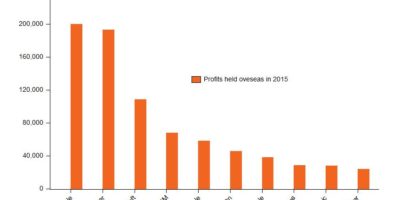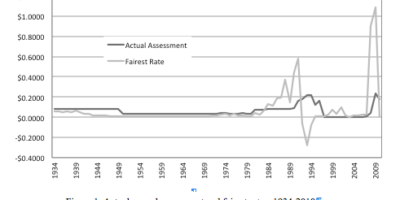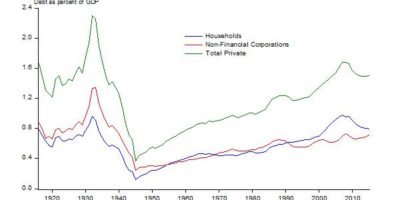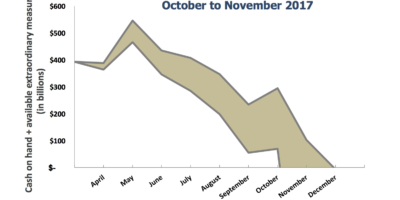Since taking office in January, President Trump has cancelled 13 regulations issued by Obama administration agencies thanks to a hitherto rarely used law Congress passed over 20 years ago. Congress and the president could potentially cancel thousands of other rules the same way.
READ MOREAmericans spend $400 billion dollars per year to comply with the tax code. Americans also dedicate 9 billion hours of labor to comply with the current tax code. Beyond costly compliance, the current tax code distorts investment and work decisions in the economy. Something needs to be done to simplify the tax code and make it pro-growth.
READ MOREWhen people refer to the national debt, they almost always mean the debt owed by our government. But there are actually two important types of debt in the American economy: government debt, and private debt owed by households and businesses.
READ MORE
House Speaker Paul Ryan recently proposed a tax plan called A Better Way: A Vision for a Confident America. Ryan’s plan to make the United States more competitive includes a tax cut for businesses, a switch to a territorial tax system, and a border-adjustment tax. A tax cut and a switch to a territorial system would be positive for the economy. On the other hand, the border-adjustment tax would work like a tariff. It would encourage inefficient domestic production, which would raise prices and reduce real output. Over the long run the BAT would not even reduce the trade deficit.
READ MORE“Nothing is so permanent,” said Milton Friedman, “as a temporary government program.”
READ MORE
Many economists have argued that government mortgage programs and low interest rates policies caused the 2008 financial crisis. We maintain that government deposits insurance, provided in the United States by the Federal Deposit Insurance Corporation (or FDIC), may have also been a contributing factor. By failing to price risk fairly, the FDIC encourages banks to increase their risk-taking activities.
READ MOREBitcoin, the world’s first form of digital cash, is a nascent invention that has overturned centuries of commonly-held assumptions about monetary policy and the role of government in the provision of money. Whereas universities have long taught that money can only be provided by a government that guarantees it and demands its use in taxation, Bitcoin has thrived for eight years without any government backing it, tantalizingly offering a glimpse of a future separation between state and money, starving government of the fuel that powers its totalitarian impulses and warlike tendencies.
READ MOREIn my last article and blog on Bitcoin, I discussed some issues that Bitcoin faced from consolidation and the increasing professionalization of Bitcoin “mining.” These issues may soon be coming to a head in an argument about Bitcoin’s underlying code that offers two divergent paths for the future of Bitcoin – or a third way in which it splits into two separate assets. This possibility is both a serious concern for Bitcoin users and investors.
READ MOREThe ways of the regulatory state go like this: when a crisis erupts, don’t ask how earlier government interventions may have made the crisis possible or worse than it would have been. Rather, denounce private greed, declare good intentions, pile new regulations atop old, and hope for the best.
READ MOREWe ought to know by now that good intentions alone cannot make a government policy beneficial. Since the law of economics—market forces—are inexorable, we should not expect even good will to withstand them. “Nature to be commanded,” Francis Bacon said, “must be obeyed.” Similarly, if market forces are to serve society, they must be respected.
READ MORE
The level and growth of a nation’s private debt, more than public debt, predicts the worst recessions.
READ MORE
The Bipartisan Budget Act of 2015 suspended the debt ceiling through mid-March of this year. On March 16, the debt ceiling was raised to the current level. When the debt ceiling is reached, the Treasury will not be able to issue more debt to borrow new funds from the public. Instead, the Treasury must take extraordinary measures to raise cash. Extraordinary measures are policies that temporarily lower the national debt by reducing the Treasury securities held by government agencies—known as intragovernmental debt.
READ MORE250 Division Street | PO Box 1000
Great Barrington, MA 01230-1000
Press and other media outlets contact
888-528-1216
press@aier.org
This work is licensed under a
Creative Commons Attribution 4.0 International License,
except where copyright is otherwise reserved.
© 2021 American Institute for Economic Research
Privacy Policy
AIER is a 501(c)(3) Nonprofit
registered in the US under EIN: 04-2121305